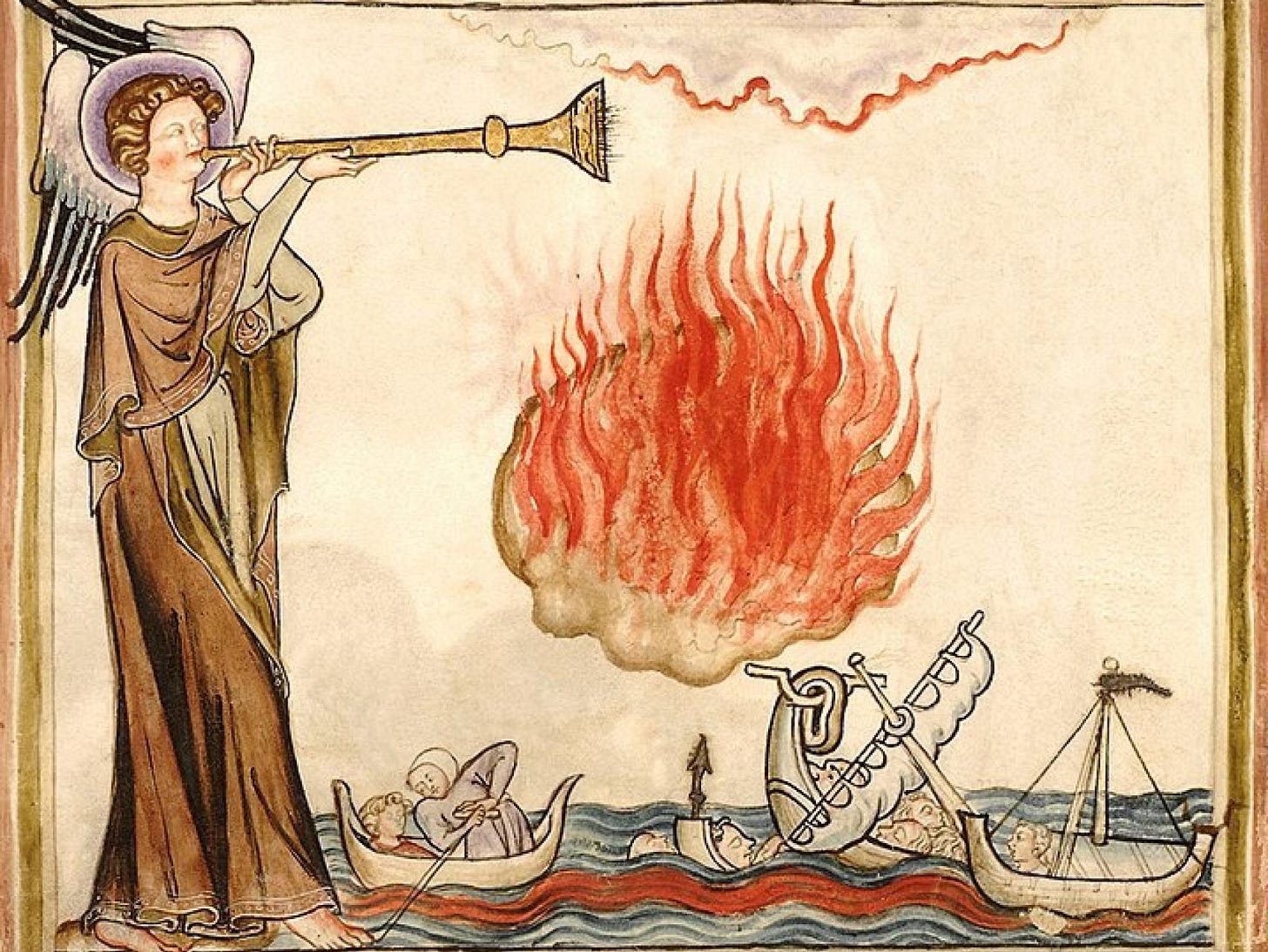Inside Out
Baudrillard, the Book of Revelation, and some news
When I told you all a few weeks back that I’m working on a new book, I was unsure how this would work alongside ongoing writing commitments. What I’ve found so far is that the one- and two-day stretches of working time I’ve been able to carve out for the book have produced three chapters that have all the ideas but are still, like a half-made tailored jacket, inside-out with all the seams showing and the facing flapping about.
I need longer consecutive stretches of working time, or this isn’t going to work.
So I’ve decided to do things here a bit differently. I’m going to go stealth (ish) mode on Substack until Christmas, so I can have a run of weeks with at least three consecutive deep-work days to focus on the book. My hope is that this will enable me to get those initial chapters with all the seams the right way round, and the whole thing flowing as it should.
I’m hoping that if this does the trick I’ll resume normal Substacking after Christmas, then perhaps go stealth mode again for a few weeks roughly every third month, until the manuscript is done. In the meantime I won’t be gone from Substack, but while in stealth mode my updates will be shorter. I’ll share what’s in my book stack this week, quick takes where that feels right, and perhaps for paid supporters outtakes and previews from the still inside-out work in progress on The King and the Swarm. (Inside-outtakes?)
This week, a book stack: this one’s all critical theory and theology. Though, thinking about it, are those really two distinct categories? Maybe they shouldn’t be….
Body and Identity: A History of the Empty Self - Angela Franks
This is a new title from theologian and Catholic University of America professor Angela Franks. Her aim is gratifyingly ambitious: essentially Charles Taylor’s Sources of the Self but more Catholic in its priors, less turgid in its prose, with post-structuralism and the missing bit between Augustine and Descartes added back in. Her theme is the “empty self”, the evacuated, self-constructed idea of “identity” that has superseded the soul in our modern conception of what it is to be a person.
Unlike Taylor, Franks has included a medieval prehistory of “identity”. Coming after Taylor, she’s read the post-structuralists. She is remarkably erudite, a lucid writer, and comfortable toggling back and forth between metaphysical and postmodern vantage-points, meaning she can draw intellectual flexibility from the latter, without ever sacrificing the former’s commitment to truth. Absolute catnip for a nerd like me, and even though it’s not directly relevant to The Book I’m clawing out time to read because it’s just so, so good.
America - Jean Baudrillard
A classic of modern cultural theory, America is an account by the French sociologist and philosopher Jean Baudrillard of visiting America during the Reagan era. Baudrillard is perhaps best-known for his theories of “simulation” as an essential component of postmodern life, and while I’m not sure you can say he “grounds” those theories in this travelogue-cum-vision-quest I’ve found his reflections on the essential modernity of America, and its relation to the Old World, richly resonant in relation to the current book. One of the unanswered questions that makes me want to write The King and the Swarm is the puzzle of what becomes of America, the nation born of the print revolution, in a comprehensively post-print world. Though some elements of Baudrillard’s America, and especially of its relation to technology and simulation, feel superseded by the internet, America feels like an early response to that problem. His insights have already woven themselves into the core of my (still inside-out) first chapters.
The Book of Revelation
This ancient, visionary account of the End of Days has begun popping up all over the place, in the cutting-edge subcultures that surround America’s tech vanguard. But because the book is still inside-out I still struggle to explain why the Book of Revelation has already emerged as one of its central motifs. Perhaps the best I can say is that if it’s good enough for Hereticon, and for Scott Alexander, it would be remiss of me to try and give an account of the digital transition without referencing it. A central theme of the book is tech Singularities: the hypothetical moment when we merge with our own machines. One of the central elements in every mention I see of the Singularity is a sense of these as a kind of secular Rapture, or End Times: a moment when what we know about the world changes so completely that it is both an end and a revelation. So with this in mind why reinvent the wheel? The thematic OG for such discussions is the Book of Revelation, and its double meaning of “apocalypse” as both disastrous end, but also transformation of what is known.
Your Support Means A Lot
So that’s what is on my reading pile this week. And this is a plea for your patience, I guess. Your support means a lot to me; the publishing market being what it is, all of you together adds up to the subsidy that makes it possible for me to write long-form at all. (Like crowdfunding a publisher’s advance.) So I appreciate anyone who feels able to stick around! But times are hard, and I totally understand if you signed up for a paid subscription to my more usual longer-form weekly essays, not helping crowdfund a book, and a few weeks of Mary in stealth mode doesn’t cut it for you.
Obviously if this isn’t for you and you’re a weekly subscriber you can can just bounce. No hard feelings! But if you paid for an annual sub and would prefer to cut loose early, just reply to this message with “refund” and I’ll sort it.
For those of you who do feel able to stick with me: thank you for your trust and patience, and I will do my level best to make the end result worth it. And with that, back down the rabbit hole…




I consider Substack subscriptions to be like farmer CSAs. They require providing seed and fertilizer money up front, trusting the farmer, and hoping that nothing disastrous happens during the growing season, LOL. So go fallow in one field while you cultivate something new and exciting in another. I'm good. I can wait.
I for one am going nowhere! Hope you get the time you need to complete the book.